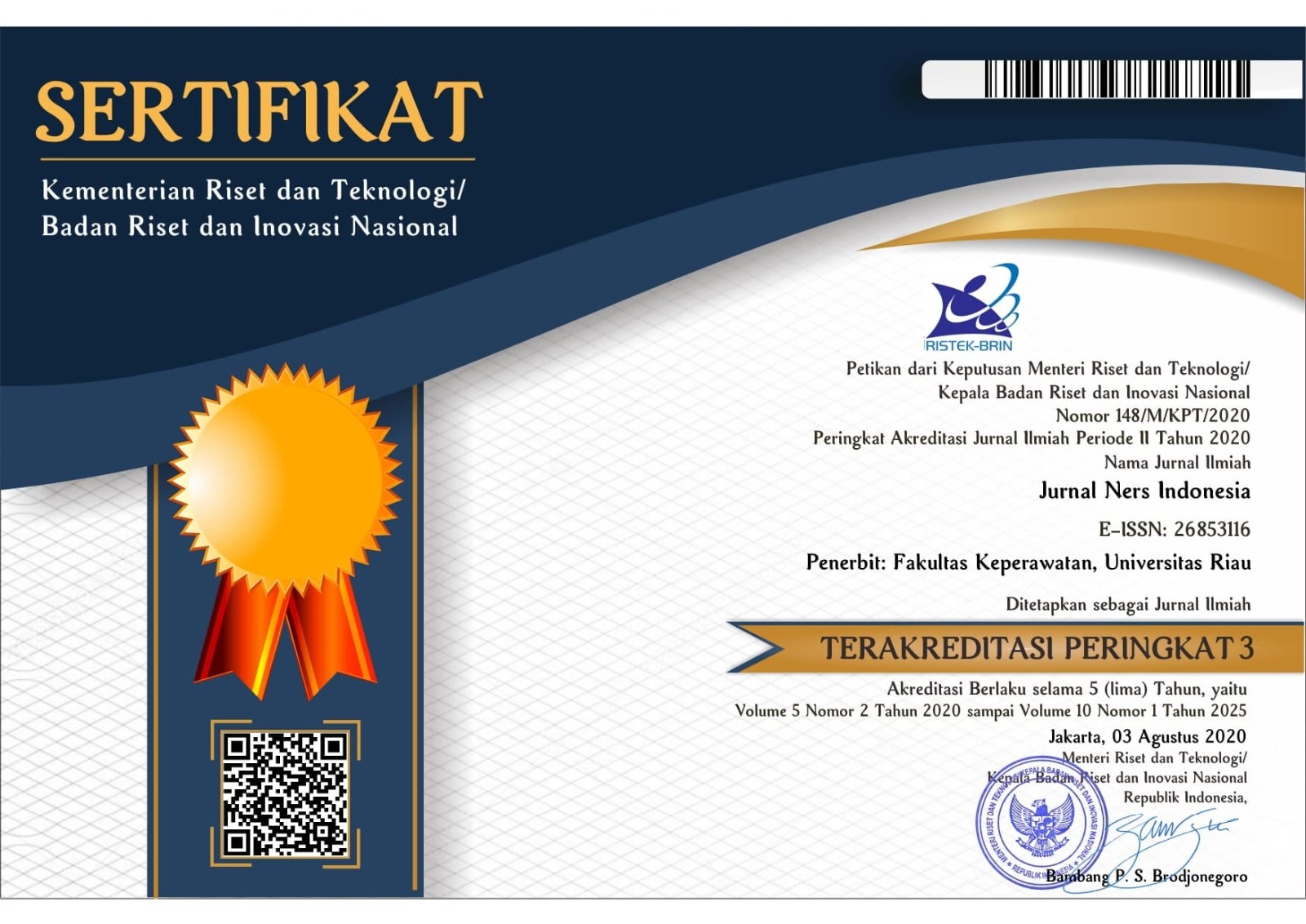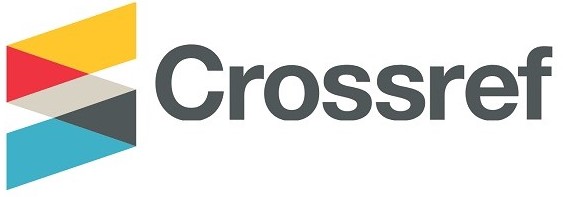TERAPI ALQURAN MEMINIMALKAN RISIKO DEPRESI IBU HAMIL DENGAN FETAL ANOMALY: PENERAPAN EVIDENCE BASED PRACTICE
DOI:
https://doi.org/10.31258/jni.9.1.80-86Keywords:
depresi, fetal anomaly, kehilangan, mendengarkan AlquranAbstract
Kehamilan dengan fetal anomaly menimbulkan distres pada orang tua, terlebih jika kehamilan tersebut merupakan kehamilan yang sangat diharapkan dan sudah direncanakan. Stres yang dirasakan karena adanya pengalaman tidak menyenangkan berupa kehilangan dapat memberikan dampak berupa trauma pada kehamilan berikutnya. Studi kasus ini dilakukan pada dua pasien yang didiagnosa mengalami fetal anomaly pada kehamilannya yang berlokasi di salah satu rumah sakit rujukan Nasional. Studi kasus ini dilakukan dengan mengaplikasikan evidence based practice (EBP) yang dilakukan dari masa kehamilan sampai dengan masa postpartum. Umumnya, ibu dan keluarga merasakan kesedihan, kecemasan, membutuhkan informasi terkait kelainan dan juga dilema dalam membuat keputusan terkait terminasi kehamilan. Salah satu intervensi keperawatan yang dapat dilakukan untuk meminimalisir dampak kehilangan yaitu dengan melakukan pendekatan spiritual. Metode pelaksanaan EBP terkait pendekatan spiritual pada studi ini adalah dengan mendengarkan bacaan Alquran. Edinburgh Postnatal Depression Scale digunakan sebagai alat ukur untuk menilai risiko depresi, dengan pertimbangan skala ini berisi pertanyaan yang sedikit dan mudah untuk dianalisis. Hasil penerapan EBP, terdapat perubahan nilai skala depresi menuju kearah positif, sehingga mendengarkan bacaan Alquran dapat dijadikan salah satu intervensi bagi perempuan yang didiagnosis mengalami kehamilan dengan fetal anomaly untuk meminimalisir risiko depresi.References
Aite, L., Zaccara, A., Mirante, N., Nahom, A., Trucchi, A., Capolupo, I., & Bagolan, P. (2011). Antenatal diagnosis of congenital anomaly : a really traumatic experience ? Journal of Perinatology, 31, 760–763. http://doi.org/10.1038/jp.2011.22
Chang, M, Y., Caruso, N., Haldeman, S., McNamara, M., Noyes, D., Caroll, D. L. (2001). Effects music therapy on psychological health of women during pregnancy. Journal of Clinical Nursing, 17, 2580-2587
Czeizel, A. E., Dudás, I., Vereczkey, A., & Bánhidy, F. (2013). Folate Deficiency and Folic Acid Supplementation: The Prevention of Neural-Tube Defects and Congenital Heart Defects, (i), 4760–4775. http://doi.org/10.3390/nu5114760
Forouhari, S., Hanorvaran, R., Maasoumi, R., RObati, M., Zadeh, I. H., & Setayesh, Y. (2011). Evaluation of auditory effects of the sound of Quran e karim on labor pain. Journal of Quran and Medicine, 1, 4-18
Hunt, K., France, E., Ziebland, S., Field, K., & Wyke, S. (2009). “My brain couldn ” t move from planning a birth to planning a funeral ’: A qualitative study of parents ’ experiences of decisions after ending a pregnancy for fetal abnormality. International Journal of Nursing Studies, 46, 1111–1121.
Jabbari, B., Mirghafourvand, M., Sehhatie, F., & Mohammad-Alizadeh-Charandabi, S. (2017). The Effect of Holly Quran Voice With and Without Translation on Stress , Anxiety and Depression During. Journal Religy Health, 1–11.
Kashyap, N., Pradhan, M., Singh, N., & Yadav, S. (2015). Early Detection of Fetal Malformation , a Long Distance Yet to Cover ! Present Status and Potential of First Trimester Ultrasonography in Detection of Fetal Congenital Malformation in a Developing Country : Experience at a Tertiary Care Centre in India. Journal of Pregnancy, 1–9.
Kenkhuis, M. J. A., Bakker, M., Bardi, F., Fontanella, F., Bakker, M. K., Fluerke-Rozema, J. H., & Bilardo, C. M. (2018). Effectiveness of 12 – 13-week scan for early diagnosis of fetal congenital anomalies in the cell-free DNA era. Ultrasound Obstet Gynecol, 51, 463–469.
Keshavarz, M., Eskandari, N., Jahdi, F., Ashayeri, H., Hosayni, F., & Kalani, M. (2010). Effect of Quran on physiological responses of premature infants hospitalized in the icu. Semnan Univ Med Sci J, 11(3), 169-177
Khatoni, A. (1997). The effect of reciting the Quran on anxiety of patients hospitalized in the cardiac intensive care unit of selected hospitals in tehran. Msc. thesis
Mahjoob, M., Nejati, J., & Hosseini, A. (2016). The Effect of Holy Quran Voice on Mental Health. Journal of Religion and Health, 55(1), 38–42.
Mills, T. A., Ricklesford, C., Cooke, A., Heazell, A. E. P., Whitworth, M., & Lavender, T. (2014). Parents’ experiences and expectations of care in pregnancy after stillbirth or neonatal death: A metasynthesis. BJOG: An International Journal of Obstetrics and Gynaecology, 121(8), 943–950.
Mirbagher, A. N., & Ranjbar, N. (2010). Effects of recitation of holy Quran an anxiety of women before caesarean section: a randomize clinical trial. Qom University of Med Sciences, 4(1), 15-19
Mirmolaee, T. (1998). Comparison effect of Quran sound and music on the pain intensity in active phase of first stage labor in primipar women hospitalization in two hospital in tehran. Tehran: Tehran University of Medical Sciences
Navidi, A. A., & Ghasemi S. K. (2003). Comprehensive encyclopedia of medicine: traditional and modern medicene methods. Tehran: Tabib
Nilsson, U. (2008). The anxiety and pain-reducing effects of music interventions: a systematic review. AORN Journal, 87, ¬5-94
Pedersen, M, et al. (2017). Exposure to air pollution and noise from road traffic and risk of congenital anomalies in the danish national birth cohort. Environmental Research, 159, 39-45.
Polkki, T., Korhonen, A., & Laukkala, H. (2012). Expectations associated with the use of music in neonatal intensive care: a survey from the viewpoint of parents. Journal Spec Pediatr Nurs, 17(4), 321-328
Tucker, J. A. (2016). The experience of the expectant mother following a diagnosis of a fetal anomaly. University of Alabama.
WHO. (2016). Congenital anomalies. Retrieved from http://www.who.int/mediacentre/factsheets/fs370/en/ on 26 Desember 2017











